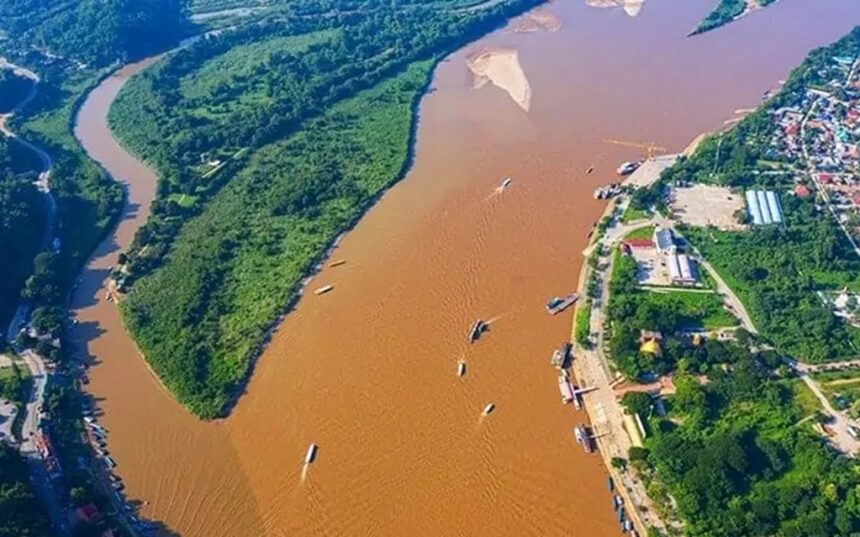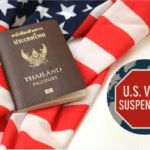CHIANG RAI – The Mekong River Commission (MRC) Secretariat has raised significant concerns after discovering heavy metal contaminants, specifically arsenic and mercury, in the Mekong River. The source of these pollutants appears to be poorly controlled mining activities taking place in a self-governed region of Shan State in Myanmar. These findings highlight the urgent need for international collaboration to address the environmental hazards posed by mining operations and their impact on the water quality of one of Southeast Asia’s most vital waterways.
Recent tests conducted by the MRC indicate alarmingly high levels of arsenic in several locations along the river. Water samples collected from the Kok River and nearby stretches of the Mekong revealed arsenic concentrations exceeding the safe limit of 0.01 mg/L at four out of five monitored sites. This situation has raised red flags for local communities that rely on the river for their daily needs, including drinking water, fishing, and irrigation.
While areas upstream near the Myanmar–Laos border and downstream at Luang Prabang, Laos, showed arsenic levels below the recommended limit, the section of the river just north of the Golden Triangle and Thailand’s Chiang Khong district exhibited notably elevated arsenic concentrations. This discrepancy underscores the localized nature of pollution sources and the necessity for targeted interventions to mitigate the contamination in specific hotspots.
Interestingly, no lead was detected in the Mekong within Laos, suggesting that the pollution is likely stemming from sources outside the country. Data released by the Thai Pollution Control Department in May further indicated that average arsenic readings were around 0.025 mg/L, exceeding safe thresholds. This data compels further investigation into transboundary pollution and the responsibilities of nations sharing the river.
In light of these findings, the MRC has classified the situation as “moderately serious” in accordance with its water quality emergency protocols. This classification serves as a call to action for stakeholders across the region to prioritize water quality management and pollution control measures.
In response to the alarming contamination levels, the MRC Secretariat is organizing joint monitoring efforts aimed at enhancing oversight and management practices among the countries involved. A crucial meeting and field visit are scheduled for July 21 in Chiang Rai, during which representatives from Laos, Myanmar, and Thailand will work to reach a consensus on a comprehensive monitoring plan. This collaborative effort is intended to establish a long-term strategy for effective cooperation in managing the ecological health of the Mekong River Basin.
This initiative comes at a time when cross-border water pollution has emerged as a pressing environmental challenge, mainly attributed to unsafe mining practices in Myanmar. The presence of arsenic and other heavy metals, including mercury, has also been confirmed in the Kok and Sai Rivers, which flow through northern Thailand before converging with the Mekong. This interconnected pollution issue requires a collective effort from all affected nations to safeguard the region’s natural resources.
The Thai Pollution Control Department is closely monitoring the situation, particularly as contamination levels often worsen during the rainy season. Officials have issued advisories to residents in affected areas, urging them to refrain from using river water for agricultural or personal purposes due to potential health risks. These warnings are critical for preventing health crises within vulnerable communities.
Concurrently, the Thai government is preparing to initiate direct dialogues with Myanmar authorities to devise effective and lasting solutions to the pollution crisis. Officials emphasize the importance of safeguarding communities that depend on these rivers for their livelihoods, as the health of the river ecosystems directly impacts food security and community well-being.
The Mekong River Commission
The Mekong River Commission (MRC) is an intergovernmental organization established on April 5, 1995, through the Mekong Agreement, which was signed by Cambodia, Laos, Thailand, and Vietnam. The MRC plays a vital role in ensuring that the countries in the Mekong region can work together to address cross-border water management issues and promote sustainable development.
Its primary goal is to promote and coordinate the sustainable management and development of water and related resources in the Lower Mekong River Basin for the mutual benefit of its member countries and the well-being of their populations. This objective is increasingly relevant in light of growing environmental challenges, including climate change and pollution.
The MRC serves as a platform for water diplomacy and acts as a knowledge hub for water resource management in the region. By facilitating dialogue among member countries, the MRC fosters collaborative approaches to shared challenges and leverages collective expertise to develop effective strategies.
The MRC focuses on cooperative management of the Mekong River’s resources, addressing critical areas such as flood and drought management, fisheries, agriculture, hydropower, navigation, and environmental protection. It provides scientific analysis, data sharing, and technical advice to support sustainable practices across various sectors, ensuring that development efforts align with ecological conservation.
The MRC is financed by its member countries and development partners, including the Asian Development Bank, USAID, and other nations such as the UK, which contributed $190,000 in 2024 for flood and drought communication initiatives. These funding efforts are essential for maintaining ongoing projects and enhancing the capacity of the MRC to respond to emerging challenges.
Collaboration is a cornerstone of the MRC’s operations, and it partners with organizations like the U.S. Army Corps of Engineers and NASA through initiatives such as the Mekong Water Data Initiative and SERVIR Mekong. These partnerships enhance the MRC’s ability to harness advanced technology and data for improved decision-making in water resource management.














